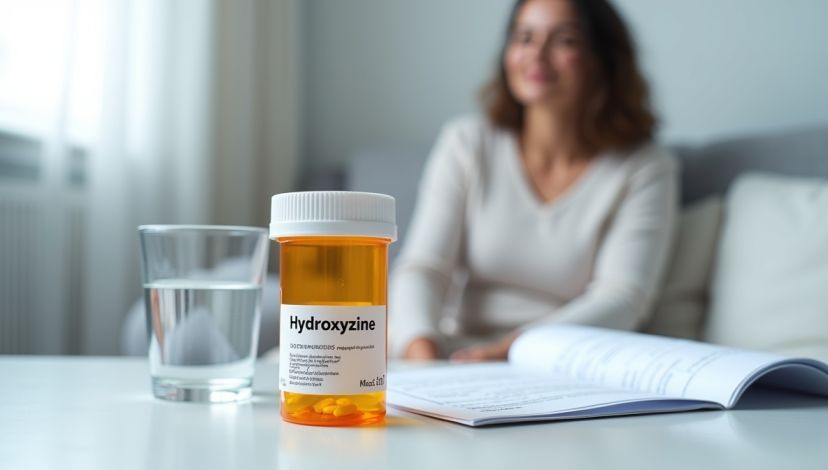Millions of people in the world are facing anxiety issues that influence everyday life, work, and relations. For those seeking relief beyond therapy or conventional antidepressants, hydroxyzine for anxiety presents a compelling option. The drug has earned popularity through the alleviation of anxiety symptoms in a short period of time without any dangers that attend other medications.
Hydroxyzine is a histamine and was developed to treat animal allergies, although it has the approval of the FDA to treat anxiety as well. In comparison to other typical anxiety drugs such as benzodiazepines and SSRIs, hydroxyzine is usually an agent that is often used in the short term, thus its calming effect which does not result in high dependence levels.
Whether you are newly exploring anxiety treatments or have struggled with ineffective medications, understanding hydroxyzine for anxiety is essential. The guide provides the information on the mechanism of action, potential applications and benefits, possible side effects, comparison with other medications, and useful recommendations so that mental health patients could feel comfortable in making their choice.
Key Takeaways:
- Hydroxyzine inhibits symptoms of anxiety by influencing serotonin and histamine to improve calmness.
- It is accepted in the short term, ok in relieving generalized anxiety disorder (GAD), and may be useful in relieving insomnia caused by an anxiety disorder.
- Hydroxyzine is quite sedative and should be used long as long as caution is taken in activities that need alertness.
What is Hydroxyzine and its anxiety mechanism?
Hydroxyzine is an antihistamine which is usually prescribed in common forms of Vistaril and Atarax. It was originally used to cure allergies, the division in the nervous system by it makes it helpful in the case of anxiety.
Hydroxyzine has mostly been used to block receptors of histamine in the brain, and this aids in the reduction of the symptoms of allergies and leads to sedation. The interesting fact about it is that it also affects the serotonin levels, a major neurotransmitter used in regulating the mood levels, thus it is distinguishable among other antihistamines.
The drug is fast-acting and takes effect within a half an hour to one hour of ingestion and alleviates anxious symptoms such as nervousness, restlessness, and panic attacks. It works especially well in generalized anxiety disorder (GAD), which it curbs the worry and the feeling of tension.
Real-life example:
The use of hydroxyzine was favorable in a GAD patient who happened to be 45 years who felt to use it on an as-needed basis when the anxiety attacks were imminent. Hydroxyzine was also used under the combination of a longer-term antidepressant, which facilitated symptom control as the other medication induced physiological action over weeks.
Note: The sedative effect of hydroxyzine may lead to drowsiness, and, therefore, this drug should be consumed with care even in case of driving a car or using any working machines.
Benefits and Uses of Hydroxyzine for Anxiety
Hydroxyzine has a number of properties, which turn out to be the strong aspects of it in terms of anxiety treatment:
- Quick relief: The drug is effective after a short time, as opposed to most antidepressants, which take several weeks to be effective.
- Anxiety: The only antihistamine to be FDA-approved in the anxiety treatment context is hydroxyzine.
- Because it is a non-addictive alternative: It is not linked with an addictive risk like that of benzodiazepines, which are usually used to treat cases of anxiety.
- Dual use: The remedy relieves musculoskeletal pain besides removing anxiety due to sleep disorders, such as insomnia triggered by anxiety and allergic reactions, which make a person itch.
- Flexibility: Hydroxyzine may be used either separately with or combined with the consumption of such drugs as buspirone or SSRIs in case of long-term treatment.
hydroxyzine vs benzodiazepines Anxiety Comparison Table
| Feature | Hydroxyzine | Benzodiazepines |
|---|---|---|
| Mechanism | Blocks histamine and affects serotonin | Enhances GABA neurotransmitter activity |
| Speed of action | Within 30-60 minutes | Within 15-60 minutes |
| Addiction risk | Low | High |
| Approved for long-term use | No, short-term only | Sometimes |
| Common side effects | Drowsiness, dry mouth | Drowsiness, dependence, tolerance |
| Use in elderly patients | Caution: increased drowsiness | Caution: fall risk, dependence |
Table description: The table is an opportunity to compare hydroxyzine with benzodiazepines about the most important to be considered concerning anxiety treatment, which is why hydroxyzine, in some situations, may be a more effective variant.
ALT text: Anxiety treatment hydroxyzine versus benzodiazepines comparison chart to define the differences in the mechanism, side effects, and the risk of addiction.
Understanding Properly the Use of Hydroxyzine to Treat Anxiety
Prescriptions of hydroxyzine are normally issued by a dosage of the drug, relying on the degree of symptoms and patient variables, such as age. Typical tablet, capsule, or syrup forms of the drug are employed.
Typical dosage:
- Adults: 50 to 100 mg four times daily to achieve a relieving effect on nervousness and stress.
- Onset: Its effects take place between 30 minutes to 1 hour and remain between 4 to 6 hours.
Patients are recommended to use hydroxyzine with the help of a physician in case of:
- They are advanced in ages (65+), as they are at high risk of being sedated.
- They possess a problem concerning the heart rhythm or have allergic reactions to antihistamines.
- They either have babies or they are breast-feeding.
Expert insight:
According to Dr. Michael K. Newman, a board-certified plastic surgeon, the drug hydroxyzine can be especially effective in patients that do not respond or tolerate conventional anxiolytic medications such as the benzodiazepines.
In practice, patients will tend to utilize hydroxyzine during panic attack or acute panic episodes. Being possibly leading to the development of tolerance, the use of tolerance can be advised by the doctors to be limited to a narrow span of time or as a bridge until other medicines start to work.
Note: Hydroxyzine should not be taken with alcohol or other sedatives because it could add to drowsiness and weaken balance.
Potential Side Effects and Risks of Hydroxyzine for Anxiety
In general, hydroxyzine can be safely used and well-tolerated, but it has several side effects that should be of concern to the patients. The adverse effects that are the most frequent are:
- Sedation or drowsiness (reported by almost 28 percent of users)
- Dry mouth
- Headache
- Light-headedness or dizziness
- In rare cases, there is a gain in weight and sleeplessness
Serious side effects rarely include allergic reactions, or unusual, rapid, or irregular heartbeats. Those patients who have a pre-existing heart rhythm illness should make it known to their health professional prior to the initiation of hydroxyzine.
Tolerance and dependence:
Although hydroxyzine is not as addictive as benzodiazepines, there is a tendency for users to develop tolerance, and this diminishes its capability to alleviate anxiety. Thus, it is normally given as a short-term or intermittent treatment.
Side effect table: Hydroxyzine Common and Rare side effects
| Side Effects | Common (≥10%) | Less Common (<10%) |
|---|---|---|
| Drowsiness | ✓ | |
| Dry mouth | ✓ | |
| Headache | ✓ | |
| Dizziness | ✓ | |
| Weight gain | ✓ | |
| Insomnia | ✓ | |
| Allergic reactions | Rare but serious | |
| Heart rhythm issues | Rare but serious |
Table description: It gives a list of both common and uncommon side effects of hydroxyzine so that a patient and a caregiver can notice possible symptoms.
ALT text: Table of side-effects of hydroxyzine listing common and rare side effects.
Hydroxyzine: Comparing to Other Medications of Anxiety: What You Need to Know
Anxiety is treated with different drugs, and each of them has some advantages and disadvantages. Among them, hydroxyzine has a few peculiarities comparing to the means like benzodiazepines, SSRIs, and buspirone, and is characterized:
- Rapid onset: unlike SSRI, hydroxyzine takes only weeks to relieve the symptoms.
- Less addictive: It is less likely to be dependant upon than benzodiazepines when used short-term.
- Sedative effects: useful where anxious states are associated with insomnia, but they are not desirable to all patients.
As documented in a Cochrane Review on the integrity of hydroxyzine in remedying generalized anxiety disorder, the agent was better off than placebo to relieve anxiety symptoms, and on par with buspirone and benzodiazepines.
Nevertheless, hydroxyzine is not typically preferred for long-term management due to risks like tolerance and sedative effects. Instead, it’s best used alongside more sustainable therapies or temporarily during acute anxiety episodes—explained further in our guide, Somebody’s Watching Me – It’s My Anxiety: How to Feel Calm Again.
Conclusion
Hydroxyzine for anxiety presents a valuable option for individuals seeking fast, effective relief from anxiety symptoms, especially when short-term treatment is needed or when other medications have not worked well. Dual effect on histamine and serotonin also helps in its calming effects, and thus, it should be used in generalized anxiety disorder and anxiety-related insomnia.
Hydroxyzine acts quickly and rarely causes addiction. It commonly causes side effects like drowsiness. It is best to take with the guidance of a doctor, especially amongst older folks or those with heart problems.
In case you want to investigate anxiety medicine or your relative is looking, it may be worth talking to a healthcare expert to find out whether hydroxyzine suits your case. The usage of hydroxyzine along with therapy or any other prescription may provide extensive assistance in the treatment of anguish.
Next steps:
- Talk to a healthcare worker regarding your signs and symptoms of anxiety.
- Inquire whether hydroxyzine may be suitable in relieving your anxiety in the short term.
- Side effects can be reduced through adherence to the instructions of dosing and safety.
FAQs
Q1: Is hydroxyzine used in the treatment of anxiety?
A: Hydroxyzine is a drug that is applied to eliminate the manifestation of anxiety and tension, especially in generalized anxiety disorder (GAD), by creating a calming and a sedative effect.
Q2: What is the time response of hydroxyzine on anxiety?
A: The action of the hydroxyzine normally begins within 30 to 60 minutes upon taking an oral dose.
Q 3: Does hydroxyzine lead to drowsiness?
A: Yes, the drowsiness is one of the common side effects of hydroxyzine because it has antihistamine characteristics.
Q4: Does hydroxyzine have an addictive effect?
A: Hydroxyzine is not addictive as a benzodiazepine, but may face tolerance if one uses it long-term.
Q5: Can elderly people take hydroxyzine for anxiety?
A: Older adults are advised to take hydroxyzine with caution because of the high likelihood of sedation and falls, only to be given under the supervision of a physician.




